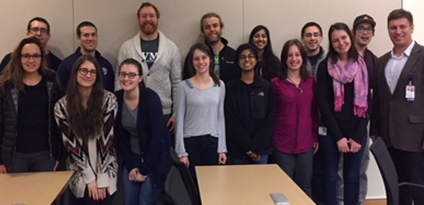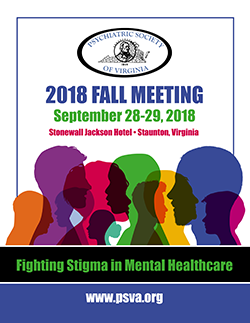Fall 2018 Issue |
|
EVMS Update
PSV Visits EVMS
By Mark Hickman
Commonwealth Strategy Group
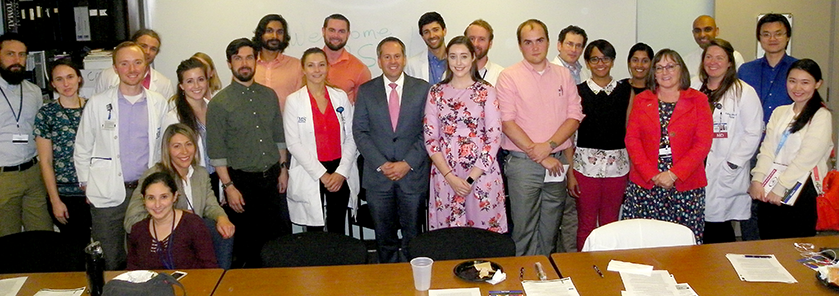
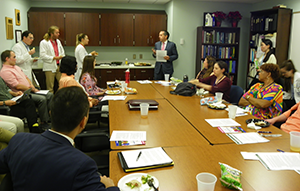 On August 15, PSV hosted lunch for EVMS residents who met with representatives from PSV and Commonwealth Strategy Group, PSV's government relations team. We discussed several legislative, regulatory and policy highlights, including Medicaid expansion, nurse practitioner independent practice, medical cannabis and pharmaceutical processors and new requirements for hospitals providing inpatient psychiatric services involving toxicology screenings and admissions. We shared how important and easy it is to get involved in PSV and the policy advocacy process. We were joined by special guest Delegate Glenn Davis (R-Virginia Beach), who offered his perspective as a legislator in the House of Delegates and answered questions. Delegate Davis is a leader in advocating for step therapy reform. He thanked the residents and EVMS for their work and service, and encouraged them to contact their legislators to share their medical and healthcare expertise to inform state policy. PSV thanks EVMS, the residents, and Del. Davis for a great conversation!
On August 15, PSV hosted lunch for EVMS residents who met with representatives from PSV and Commonwealth Strategy Group, PSV's government relations team. We discussed several legislative, regulatory and policy highlights, including Medicaid expansion, nurse practitioner independent practice, medical cannabis and pharmaceutical processors and new requirements for hospitals providing inpatient psychiatric services involving toxicology screenings and admissions. We shared how important and easy it is to get involved in PSV and the policy advocacy process. We were joined by special guest Delegate Glenn Davis (R-Virginia Beach), who offered his perspective as a legislator in the House of Delegates and answered questions. Delegate Davis is a leader in advocating for step therapy reform. He thanked the residents and EVMS for their work and service, and encouraged them to contact their legislators to share their medical and healthcare expertise to inform state policy. PSV thanks EVMS, the residents, and Del. Davis for a great conversation!
Addiction Education
By John C. Hardy
Stephanie Peglow, DO, MPH
Twenty-seven high school students from the Norfolk/Hampton Roads area attended Camp Neuro at EVMS this past month. Camp Neuro focuses on introducing adolescents to the fields of psychiatric and neurologic medicine. The week long camp was run by volunteer students, faculty, and physicians and included a talk about addiction psychiatry and public health by Dr. Stephanie Peglow, a local addiction psychiatrist and assistant professor at EVMS. Students learned about the importance of community-based healthcare interventions and how to avoid thinking of healthcare exclusively at the individual level. They discussed the importance of portraying realistic consequences of addiction in public health initiatives and discussed effective and ineffective past health campaigns. They were then tasked with creating new outreach programs aimed at preventing drug use in students their age.
One group in particular decided to tackle the issue of electronic cigarettes (i.e. Juuling) that have become very popular among adolescents. They discussed the lack of information regarding the health effects and the extra challenge that places on the healthcare community in discouraging their use among the general population. Many of the students expressed a lack of knowledge regarding consequences of certain drug use, particularly alcohol and marijuana, emphasizing a need for better educational outreach in the community.
Creating HOPES In Our Community
ByJoshua Ryan Dellinger
Wayles Haynes
Stephanie Peglow, DO, MPH
The Health Outreach Partnership of EVMS Students medical clinic, known more extensively as HOPES, began in 2011 as the only student-run free medical clinic in Virginia. Serving the mission of providing longstanding healthcare to the uninsured Norfolk population, HOPES clinic provides primary care and specialty clinics comprising ophthalmology, orthopedics, women’s health, and dermatology. In 2017, HOPES added a psychiatry specialty clinic, developed and implemented by entering medical student Joshua Ryan Dellinger. The impetus for this clinic arose from an urgent sense to address the area’s mental illness burden, reflected in data collected by federally qualified health center Sentara Norfolk General Hospital’s 2016 Community Health Needs Assessment. Therein, a disturbing set of statistics revealed the challenges faced by Norfolk’s community members.
Section 5 of the Community Health Needs Assessment reports input from focus groups presented with questions covering three areas, including community health concerns, community services needing strengthening, and vulnerable/at-risk populations within the community. The responses to these questions revealed the great need for HOPES to incorporate psychiatric services: 1) What are the most important health problems in your community? Answer: 78% mental health – behavioral health conditions (e.g. depression, anxiety, etc.); 2) Which community health services need strengthening? Answer: 61% mental health – behavioral health services; 3) Are there particular populations within the community who are vulnerable or at risk for health problems or having difficulties obtaining health services? Answer: Substance abusers; mentally ill. Across each question, mental health ranked in the forefront of community conscience, underscoring the task we had before us.
With this data in mind, our first volunteer efforts began modestly, starting with PHQ-9 screenings conducted for patients from the primary care and specialty clinics for inclusion into the incubating mental health clinic. Progress quickened as patients and clinicians each witnessed the demand for psychiatric treatment. The final pieces came together as Dr. Stephanie Peglow stepped forward to volunteer as our attending psychiatrist and to provide clinical guidance. Our care team is representative of the diverse EVMS community, and includes biomedical sciences graduate students, medical students, physician assistant students, psychiatric residents, and EVMS psychiatrists. By the conclusion of the first academic semester, the clinic was operational, and in January 2018, we treated our first patients.
Reflecting on the past half-year of our clinic’s operation, our collective experiences have been inspiring, refreshing, and heartwarming. While our patients’ issues were in many ways reflective of those seen in all psychiatric settings, consisting of challenging economic, social, and biological factors, a common element has stood out with each visit. With every single patient, there has been a unique sense of gratitude for what we do, and we have found it humbling to observe our patients’ genuine relief and appreciation for receiving the care and attention they desperately need. This experience has proven especially meaningful, as the care we provide as informed clinicians benefits ourselves as much as it does the patients, and we grow not only clinically, but personally. These encounters remind us how precious and life-altering the resources of time, attention, and access to care can be.
Through our work at HOPES, we are inspired to connect to all facets of our community, and to advocate for justice in our future practices. Our shared experiences at HOPES have confirmed our decisions to pursue medicine, and inspire us to work tirelessly to become deserving of our patients’ gratitude. For some of us, these patient encounters have been the first we’ve had, while for others, they’re only the most recent, but each has been profoundly moving and illuminating. The changes we’ve been able to make and the visible relief and thankfulness we have been fortunate enough to provide will remain as bright memories as we each move forward into our different careers. Beyond all else, the knowledge that we have worked to the best of our abilities to leave our community in better condition than when we arrived will stay with us throughout our lives, not as some generic community service initiative, but as the unique and unforgettable faces, voices, and stories of our patients. Our work with HOPES has changed the lives of everyone involved, and we could not feel more grateful.
EVMS Psychiatry Interest Group
By Komal Patel
Psychiatry Interest Group Vice President
Eastern Virginia Medical School
MD Candidate 2020
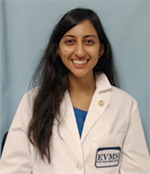 |
| Komal Patel |
This past academic year was exciting for the Psychiatry Interest Group at Eastern Virginia Medical School. In a vision to expose medical students to subspecialties within psychiatry, our year began with a discussion about telepsychiatry led by Dr. Justin Petri. Dr. Petri shared his personal experiences of providing telemental health services and the role this modality may be able to play in improving access to psychiatric services. During the second half of the academic year, the group met for dinner and a discussion about Forensic Psychiatry led by EVMS Psychiatry residency alumni, Dr. Vladimir Karpov. Dr. Karpov completed his forensic fellowship at VCU and is currently a community faculty member practicing in the Hampton Roads area. Dr. Karpov provided information about the federal and state laws regarding competency, as well as several interesting cases that stimulated discussion from members. Dr. Karpov’s insight into the Virginia treatment facilities housing patients provided great awareness of the realities of working in the field.
We were also fortunate to continue a cherished event this year, the annual Holiday Dinner and Community Service Gathering, with the support of a grants from the PSV, NAMI Norfolk, and community donations. EVMS Psychiatry medical and health professional students, residents, and faculty and staff come together for dinner and to assemble care package backpacks for patients who are discharged from the Sentara Norfolk General Hospital (SNGH) inpatient psychiatry unit. Once the backpacks are assembled, the club officers deliver them to the nurses and social workers at the SNGH psychiatry unit, who then distribute the backpacks to patients. Many of the patients are homeless and end up returning to shelters or the streets. Thus, we include valuable items such as warm clothing (sweaters, socks, hats, gloves), small fleece blankets, toiletries, snacks, and journal books and pens. Furthermore, for the first time this year, we were able to have the EVMS videographer attend the event. Our year culminated with a Psychiatry residency panel led by our EVMS program director Dr. Shriti Patel and chief resident Dr. Justin Smith.
We would like to thank our faculty advisor Dr. Fore-Arcand for her devotion to the group and without whom we would not have been able to achieve our goals.
YOUR NEWSLETTER IS NOW AVAILABLE ON YOUR SMARTPHONE AND TABLET!
JOIN PSV TODAY!
REGISTER TODAY!
PSV 2018
FALL MEETING
September 28-29, 2018
Stonewall Jackson Hotel
Staunton, Virginia
APA Find a Psychiatrist
Are you accepting new patients?
Opt into APA’s “Find A Psychiatrist” database. To view the functionality or opt-in, CLICK HERE
FYI: A link for this option has been added to the PSV website. Select the “About” button and then “Find a Psychiatrist” from the drop down.


